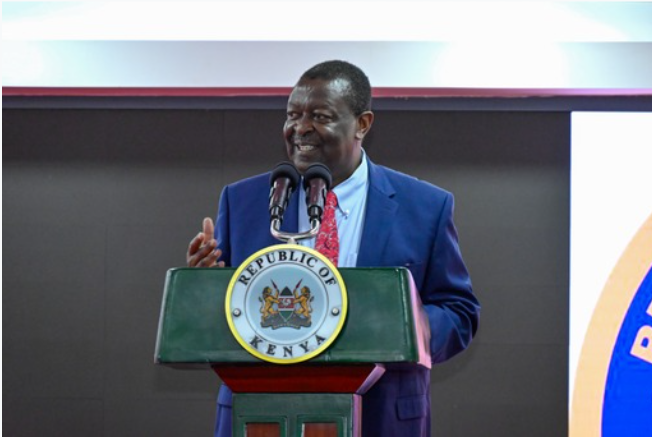

The Kenyan foreign policy must be adaptable to ensure it responds to the global emerging issues and the rapidly mutating geo-political landscape, Prime Cabinet Secretary Musalia Mudavadi has said.
Mudavadi said Kenya’s national interests and diplomatic engagements have evolved, which calls for a review of Kenya's foreign policy in 2014.
He said Parliament must ensure Kenya gets a comprehensive, coherent, and contextually relevant foreign policy framework for future purposes.
“Our collaborative efforts with Parliament through treaty ratification, budgetary oversight, legislative influence on foreign policy, and vetting key appointments such as ambassadors form the cornerstone of our foreign policy review process. This partnership is invaluable in crafting a policy that truly reflects the aspirations and priorities of our nation,” Mudavadi said.
He spoke during a consultative session with the National Assembly’s Departmental Committee on Defence, Intelligence and Foreign Relations in Nairobi.
Mudavadi said Parliament as a representative of the people should help in projecting Kenya as a nation that has a clear policy that also focuses on the aspirations of Kenyans.
“Parliament should help us establish the key pillars that we anchor our foreign policy on and how will they strengthen our position when we are interacting with our friends internationally," he added.
“Kenya wants to have strong partnerships, especially on economic diplomacy, what should be our guidelines, and how do we get the best value out of our engagements. These are some of the fundamental questions that Parliament should help us address in this review process.”
Mudavadi said as Kenya strives to achieve a free-market establishment and attract Foreign Direct Investment, Parliament through its legislative role should help shape the policy into an outcome that meets the underlined requirements.
He added that there is also a need to define various components that will be anchored in the policy ranging from the equitable allocation of opportunities, bringing transparency in the engagements with international friends, elaborating on the gains of joining regional and international blocs like the G-20, G-7, BRICS among others.
“This policy should go beyond the normal set-up and interrogate critical issues like what will be the framework to be used when making various diplomatic appointments, do we prioritise career diplomats over political appointees and the upcoming youthful cadets?”
“How are we going to fund the ministry and what are the expectations by the public in how the ministry delivers?”
Mudavadi urged Parliament to help make Kenya's foreign policy more inclusive and citizen-centred.
The final document is to be presented to President William Ruto by the end of this month ahead of the launch in December.
“Our foreign policy review process will culminate in a sessional paper that shall be tabled in Parliament for deliberations.
In this way, we intend to realize two objectives. First, as a Ministry, we shall be able to present our case to parliament for adequate funding to effectively run our missions and cater for the welfare of our foreign service," he said.
"Second, Parliament being a potent representative of the people, we shall be able to involve Kenyan people in the foreign policy development."
The review process aims to amend and enrich the 2014 Kenya foreign policy that was anchored on peace diplomacy, economic diplomacy, environmental diplomacy, diaspora diplomacy and cultural diplomacy to broaden it to reflect the emergence of new issues and trends such as Global Health, Science, Technology, Engineering and Mathematics (STEM), Space Diplomacy and Digital Diplomacy.












